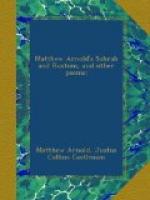Give the setting of the story. What was the topic of conversation? What stand did the poet’s friend take regarding poetry? Why turn to Greece in considering the arts? What limitations of the painter’s art are pointed out by the poet? What is his attitude toward music? What finally is “the poet’s sphere,” l. 127? Wherein then is poetry superior to the other arts? Does the author prove his point by his poem? Discuss the poem as to movement, diction, etc.
QUIET WORK
No poet, not even Wordsworth, was more passionately fond of nature than Arnold. Note his attitude in the poem.
=1. One lesson.= What lesson?
=4.= Discuss the use of the adjective “loud”; also “noisier,” l. 7.
Note the essential elements of sonnet structure in metre, rhyme formula, and number of lines. See the introduction to Sharp’s Sonnets of this Century.
SHAKESPEARE
Despite this tribute, Arnold considered Homer Shakespeare’s equal, if not his superior. What do Shakespeare’s smile and silence imply on his part? Explain in full the figure used. Do you consider it apt? Why “Better so,” l. 10? What is there in the poem that helps you to see wherein lay Shakespeare’s power to interpret life? Select the lines which most impress you, and tell why. [194]
YOUTH’S AGITATIONS
This sonnet was written in 1852, when the poet was in his thirtieth year.
=5. joy.= Be glad. =heats.= Passions.
=6. even clime.= That is, in the less emotional years of maturity.
=12. hurrying fever.= See note, l. 6.
AUSTERITY OF POETRY
=1. That son of Italy.= Giacopone di Todi.
=2. Dante= (1265-1321). Best known as the author of The Divine Comedy.
=3. In his light youth.= Explain.
=11. sackcloth.= Symbolic of mourning or mortification of the flesh.
Tell the story of the poem and make the application. Explain Arnold’s idea of poetry as set forth in ll. 12-14.
WORLDLY PLACE
=3. Marcus Aurelius= (121-180 A.D.), commonly called “the philosopher.” A celebrated Roman emperor, prominent among the ethical teachers of his time. Arnold himself has been aptly styled by Sharp an “impassioned Marcus Aurelius, wrought by poetic vision and emotion to poetic music.” [195]
=6. foolish.= In the sense of unreasonable. =ken.= The Scotch word meaning sight.
=7. rates.= Berates, reproves.
Give the poem’s theme. What is implied by the word “even,” l. 1? Does the author agree with the implication? Why so? Discuss l. 5 as to its meaning. Interpret the expressions “ill-school’d spirit,” l. 11, and “Some nobler, ampler stage of life,” l. 12. Where finally are the aids to a nobler life to be found? Do you agree with this philosophy of life?




